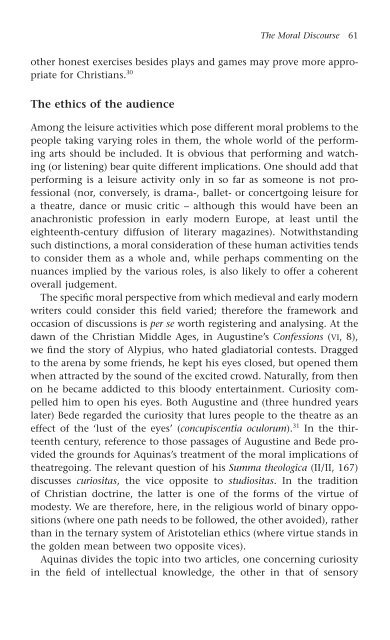Recreation in the Renaissance
Recreation in the Renaissance
Recreation in the Renaissance
- No tags were found...
You also want an ePaper? Increase the reach of your titles
YUMPU automatically turns print PDFs into web optimized ePapers that Google loves.
The Moral Discourse 61<br />
o<strong>the</strong>r honest exercises besides plays and games may prove more appropriate<br />
for Christians. 30<br />
The ethics of <strong>the</strong> audience<br />
Among <strong>the</strong> leisure activities which pose different moral problems to <strong>the</strong><br />
people tak<strong>in</strong>g vary<strong>in</strong>g roles <strong>in</strong> <strong>the</strong>m, <strong>the</strong> whole world of <strong>the</strong> perform<strong>in</strong>g<br />
arts should be <strong>in</strong>cluded. It is obvious that perform<strong>in</strong>g and watch<strong>in</strong>g<br />
(or listen<strong>in</strong>g) bear quite different implications. One should add that<br />
perform<strong>in</strong>g is a leisure activity only <strong>in</strong> so far as someone is not professional<br />
(nor, conversely, is drama-, ballet- or concertgo<strong>in</strong>g leisure for<br />
a <strong>the</strong>atre, dance or music critic – although this would have been an<br />
anachronistic profession <strong>in</strong> early modern Europe, at least until <strong>the</strong><br />
eighteenth-century diffusion of literary magaz<strong>in</strong>es). Notwithstand<strong>in</strong>g<br />
such dist<strong>in</strong>ctions, a moral consideration of <strong>the</strong>se human activities tends<br />
to consider <strong>the</strong>m as a whole and, while perhaps comment<strong>in</strong>g on <strong>the</strong><br />
nuances implied by <strong>the</strong> various roles, is also likely to offer a coherent<br />
overall judgement.<br />
The specific moral perspective from which medieval and early modern<br />
writers could consider this field varied; <strong>the</strong>refore <strong>the</strong> framework and<br />
occasion of discussions is per se worth register<strong>in</strong>g and analys<strong>in</strong>g. At <strong>the</strong><br />
dawn of <strong>the</strong> Christian Middle Ages, <strong>in</strong> August<strong>in</strong>e’s Confessions (VI, 8),<br />
we f<strong>in</strong>d <strong>the</strong> story of Alypius, who hated gladiatorial contests. Dragged<br />
to <strong>the</strong> arena by some friends, he kept his eyes closed, but opened <strong>the</strong>m<br />
when attracted by <strong>the</strong> sound of <strong>the</strong> excited crowd. Naturally, from <strong>the</strong>n<br />
on he became addicted to this bloody enterta<strong>in</strong>ment. Curiosity compelled<br />
him to open his eyes. Both August<strong>in</strong>e and (three hundred years<br />
later) Bede regarded <strong>the</strong> curiosity that lures people to <strong>the</strong> <strong>the</strong>atre as an<br />
effect of <strong>the</strong> ‘lust of <strong>the</strong> eyes’ (concupiscentia oculorum). 31 In <strong>the</strong> thirteenth<br />
century, reference to those passages of August<strong>in</strong>e and Bede provided<br />
<strong>the</strong> grounds for Aqu<strong>in</strong>as’s treatment of <strong>the</strong> moral implications of<br />
<strong>the</strong>atrego<strong>in</strong>g. The relevant question of his Summa <strong>the</strong>ologica (II/II, 167)<br />
discusses curiositas, <strong>the</strong> vice opposite to studiositas. In <strong>the</strong> tradition<br />
of Christian doctr<strong>in</strong>e, <strong>the</strong> latter is one of <strong>the</strong> forms of <strong>the</strong> virtue of<br />
modesty. We are <strong>the</strong>refore, here, <strong>in</strong> <strong>the</strong> religious world of b<strong>in</strong>ary oppositions<br />
(where one path needs to be followed, <strong>the</strong> o<strong>the</strong>r avoided), ra<strong>the</strong>r<br />
than <strong>in</strong> <strong>the</strong> ternary system of Aristotelian ethics (where virtue stands <strong>in</strong><br />
<strong>the</strong> golden mean between two opposite vices).<br />
Aqu<strong>in</strong>as divides <strong>the</strong> topic <strong>in</strong>to two articles, one concern<strong>in</strong>g curiosity<br />
<strong>in</strong> <strong>the</strong> field of <strong>in</strong>tellectual knowledge, <strong>the</strong> o<strong>the</strong>r <strong>in</strong> that of sensory










